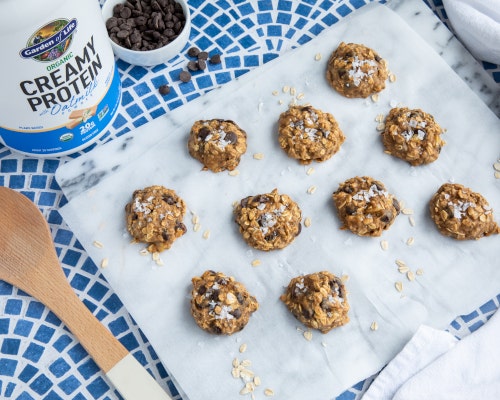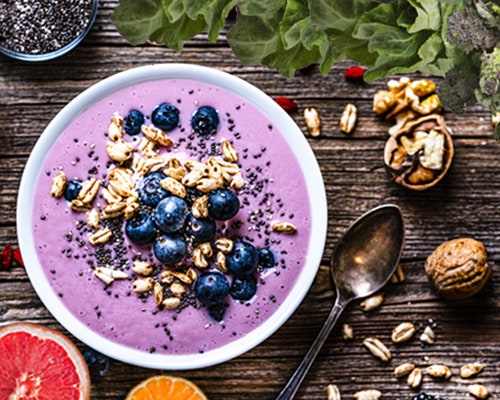5 Reasons to Go Organic
- 9/25/17
[vc_column css=".vc_custom_1505855633528{padding-right: 0px !important;padding-left: 0px !important;}" el_id="text-body"][vc_column_text]There’s no better time than now to make the decision to go organic. Designated as Organic Harvest Month, September is the perfect time to become aware of the benefits of organic products for you, your loved ones and the planet.
Organic agriculture means that the produce has been farmed in soil that contains no synthetic fertilizers or harmful pesticides. Also, studies show that organic food has a higher nutritional value.
Next time you go grocery shopping, keep these five reasons in mind when it comes to choosing organic:[vc_column css=".vc_custom_1509479226712{margin-top: -40px !important;padding-right: 0px !important;padding-left: 0px !important;}"][vc_single_image image="65575" img_size="full"][vc_column_text]Certified organic means products have no prohibited pesticides or synthetic fertilizers. The National Organic Standards Board designed a list of natural substances in organic farming that are allowed and which ones are not. NOSB members follow very strict criteria, such as the impacts of human health and the environment, when deciding which substances are considered harmful.[vc_column css=".vc_custom_1509479231956{margin-top: -40px !important;padding-right: 0px !important;padding-left: 0px !important;}"][vc_single_image image="65576" img_size="full"][vc_column_text]Many studies show that having a diet rich in organic foods is healthier. By eating organic foods, you are minimizing your risk for exposure to environmental toxins and serious health issues found in non-organic meat and produce. In addition, organic foods are the cleanest available.[vc_column css=".vc_custom_1509479236808{margin-top: -40px !important;padding-right: 0px !important;padding-left: 0px !important;}"][vc_single_image image="65578" img_size="full"][vc_column_text]That’s right – say goodbye to hormones, antibiotics and GMOs. Organic means all that bad stuff is nonexistent. USDA Organic regulations prohibit any genetically modified (GMO) ingredients in a certified organic product.[vc_column css=".vc_custom_1509479245740{margin-top: -40px !important;padding-right: 0px !important;padding-left: 0px !important;}"][vc_single_image image="65579" img_size="full"][vc_column_text]Many consumers believe that organic foods have a finer quality than non-organic foods. The more intense flavoring can be a result of a higher level of antioxidants.[vc_column css=".vc_custom_1509479254151{margin-top: -40px !important;padding-right: 0px !important;padding-left: 0px !important;}"][vc_single_image image="65580" img_size="full" css=".vc_custom_1509476297094{padding-right: 0px !important;padding-left: 0px !important;}"][vc_column_text]Organic processes help preserve crop varieties which results in higher soil quality that is safer for the environment. Since organic food production prohibits the use of all synthetic chemicals, it does not pose any threats for water contamination underground. Organic farming is significantly less damaging to the environment and unlike conventional agriculture, does not strip wildlife from their natural habitat. Instead, farmers encourage these little critters to stick around and assist them with pest control.[vc_column css=".vc_custom_1509479261615{margin-top: -40px !important;padding-right: 0px !important;padding-left: 0px !important;}"][vc_column_text]So, if you’ve ever contemplated if it was worth the extra couple of cents to pay for organic bananas vs. conventional bananas, the answer is yes. The benefits of choosing organic are priceless.
Organic agriculture means that the produce has been farmed in soil that contains no synthetic fertilizers or harmful pesticides. Also, studies show that organic food has a higher nutritional value.
Next time you go grocery shopping, keep these five reasons in mind when it comes to choosing organic:[vc_column css=".vc_custom_1509479226712{margin-top: -40px !important;padding-right: 0px !important;padding-left: 0px !important;}"][vc_single_image image="65575" img_size="full"][vc_column_text]Certified organic means products have no prohibited pesticides or synthetic fertilizers. The National Organic Standards Board designed a list of natural substances in organic farming that are allowed and which ones are not. NOSB members follow very strict criteria, such as the impacts of human health and the environment, when deciding which substances are considered harmful.[vc_column css=".vc_custom_1509479231956{margin-top: -40px !important;padding-right: 0px !important;padding-left: 0px !important;}"][vc_single_image image="65576" img_size="full"][vc_column_text]Many studies show that having a diet rich in organic foods is healthier. By eating organic foods, you are minimizing your risk for exposure to environmental toxins and serious health issues found in non-organic meat and produce. In addition, organic foods are the cleanest available.[vc_column css=".vc_custom_1509479236808{margin-top: -40px !important;padding-right: 0px !important;padding-left: 0px !important;}"][vc_single_image image="65578" img_size="full"][vc_column_text]That’s right – say goodbye to hormones, antibiotics and GMOs. Organic means all that bad stuff is nonexistent. USDA Organic regulations prohibit any genetically modified (GMO) ingredients in a certified organic product.[vc_column css=".vc_custom_1509479245740{margin-top: -40px !important;padding-right: 0px !important;padding-left: 0px !important;}"][vc_single_image image="65579" img_size="full"][vc_column_text]Many consumers believe that organic foods have a finer quality than non-organic foods. The more intense flavoring can be a result of a higher level of antioxidants.[vc_column css=".vc_custom_1509479254151{margin-top: -40px !important;padding-right: 0px !important;padding-left: 0px !important;}"][vc_single_image image="65580" img_size="full" css=".vc_custom_1509476297094{padding-right: 0px !important;padding-left: 0px !important;}"][vc_column_text]Organic processes help preserve crop varieties which results in higher soil quality that is safer for the environment. Since organic food production prohibits the use of all synthetic chemicals, it does not pose any threats for water contamination underground. Organic farming is significantly less damaging to the environment and unlike conventional agriculture, does not strip wildlife from their natural habitat. Instead, farmers encourage these little critters to stick around and assist them with pest control.[vc_column css=".vc_custom_1509479261615{margin-top: -40px !important;padding-right: 0px !important;padding-left: 0px !important;}"][vc_column_text]So, if you’ve ever contemplated if it was worth the extra couple of cents to pay for organic bananas vs. conventional bananas, the answer is yes. The benefits of choosing organic are priceless.




